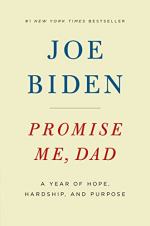|
This section contains 679 words (approx. 2 pages at 400 words per page) |

|
Promise Me, Dad Summary & Study Guide Description
Promise Me, Dad Summary & Study Guide includes comprehensive information and analysis to help you understand the book. This study guide contains the following sections:
This detailed literature summary also contains Topics for Discussion on Promise Me, Dad by Joe Biden.
The following version of this book was used to create this study guide: Biden, Joe. Promise me, Dad. Flatiron Books. 2017. First Edition. The book is subtitled “A Year of Hope, Hardship, and Purpose,” and is written in first person narration that entwines the author’s experiences dealing with a trio of particular political issues with a pair of particular personal issues.
The narrative begins with the author describing a significant family holiday – American Thanksgiving, in the year 2014. He writes of how the tradition of the annual family trip to Nantucket (in the state of Massachusetts, in what is referred to as the New England States) began, how it had continued for decades with its family rituals and routines, and how the trip in 2014 was different. This, he writes, was because his eldest son Beau was struggling with a particularly dangerous form of cancer, one that was making him increasingly debilitated.
As the narrative continues, describing the history of Beau’s experience with cancer and his interactions with his family and physicians as the disease progressed, the author makes frequent and detailed references to political responsibilities he (the author) was dealing with at the same time. Those responsibilities, he writes, had been given by then-President Barack Obama who, the author adds, had indicated early in their professional and political relationship that he felt he could, and needed to, trust the author’s experience and skills. As part of that trust, the author says, Obama gave him more responsibility than many vice presidents in history had been given.
Throughout the book, the author focuses on three particular areas, or situations, that he had been given the job of handling. The first was in Ukraine, which was fighting a military and political takeover by Russian President Vladimir Putin. The second was in Iraq, where its leader, Haider al-Abadi, was struggling to win an internal war against the Islamic rebel coalition known as ISIL. Finally, there were negotiations for political, economic, and cultural reform in three countries in Northern South America. The authorrelates insights gained in relation to all these areas of global activity to insights gained in relation to areas of personal activity – specifically, in the battle waged by the Biden family against Beau’s cancer.
There are also several descriptions of how other, more domestically situated experiences related to the author’s situation with his family and his son. Among the most significant of these are the author’s experiences speaking at memorials for people killed by gun violence – in one case the murder of two on-duty police officers; in another case, the mass shooting of black churchgoers by a white supremacist. In writing about both these situations, as well as about others, the author describes finding himself able to draw upon not only his family’s struggles with Beau’s illness, but also his own history of personal tragedy – specifically, the deaths of his first wife and his daughter in a car accident – as a means of connecting to those who were suffering tragedies of their own.
As the year passed, the author writes, and as both his international and personal commitments intensified, another layer of professional and personal stress and responsibility emerged: the question of whether he was going to run for the Presidency. As time passed, and as those other stresses and responsibilities built, the author found himself drawn in both directions – towards the Presidency (and the opportunity to do more good in the world, and with his life), and away from the Presidency (towards the opportunity to spend more time with his family). Ultimately, after Beau’s battle with cancer ended with his death, the author decided to not run: it was, he writes, not his time.
The book concludes with references to how the author began to rebuild his life after his son’s death, and found ways to live up to the values and priorities he discovered and trusted both as a younger man and as an older man – that is, before, during, and after his year of intertwined professional and personal challenges.
Read more from the Study Guide
|
This section contains 679 words (approx. 2 pages at 400 words per page) |

|



